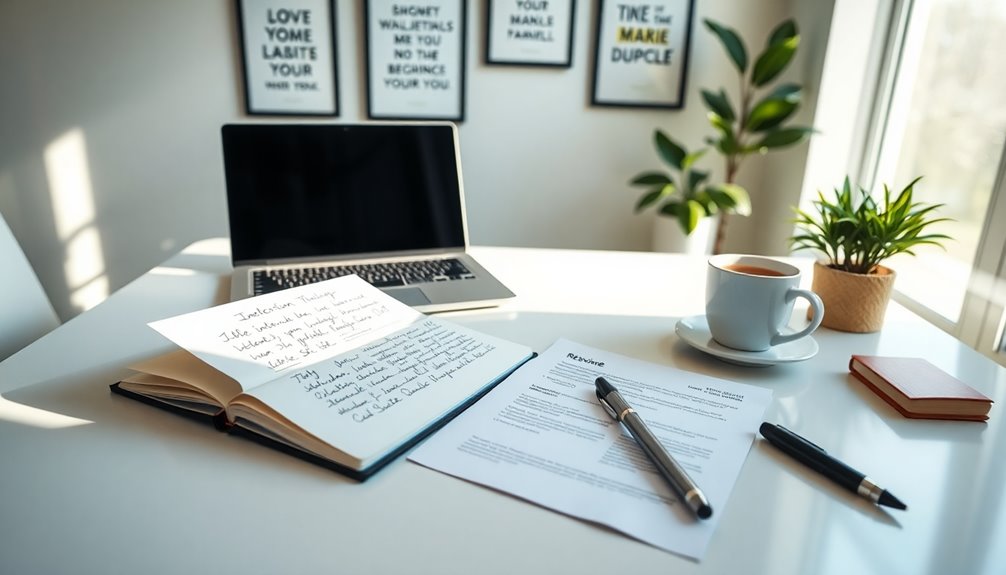To master job interviewing, start with thorough preparation. Research the company and analyze the job listing for key skills. Practice the STAR method to effectively describe your past experiences. In panel interviews, engage with each member and maintain eye contact. Dress professionally to make a strong first impression. Craft thoughtful questions that reflect your interest in the role and organization. Remember to follow up timely, expressing gratitude and interest. Finally, embrace continuous improvement by seeking feedback and refining your approach. There's much more to uncover that can elevate your interviewing game even further.
Key Takeaways
- Conduct in-depth research on the company and role to align your responses with their values and expectations.
- Practice the STAR method to effectively articulate past experiences in behavioral interviews.
- Prepare thoughtful questions that demonstrate engagement and interest in the role and company culture.
- Dress professionally and arrive early to showcase confidence and respect for the interview process.
- Follow up with a thank-you email after the interview to express gratitude and reiterate your interest in the position.
Preparation for Success

Preparation is key to succeeding in job interviews, and it starts with thorough research. You should explore the company's website to grasp its history, recent announcements, and core values. Understanding the company's culture will give you an edge, so read up on its latest achievements and future goals. Utilize resources like Indeed Company Pages to gather insights from employee reviews and available positions.
Next, closely study the job listing. Identify essential keywords related to required skills and responsibilities. This knowledge will help you tailor your responses effectively. Practice answering common interview questions, keeping your answers direct and succinct. The STAR method (Situation, Task, Action, Result) can help structure your responses, ensuring you highlight relevant experiences. Additionally, maintaining emotional alignment can enhance your confidence and clarity during the interview process.
Don't forget personal preparation. Review your CV or application details and create a brief list of key points about yourself. Prepare thoughtful questions to ask the interviewer, showing your genuine interest in the role. Additionally, developing emotional intelligence can enhance your ability to navigate the interview dynamics effectively. Finally, logistical preparations matter too—arrive early, check your tech for virtual interviews, and silence your phone. Engage in mock interviews to refine your tone and body language, setting the stage for success.
Understanding Behavioral Interviews

Behavioral interviews have become a staple in the hiring process, and understanding their structure can give you a considerable advantage. These interviews focus on your past behavior, asking you to recount specific instances from your work experience. Typically, they follow a structured format, using a predetermined set of questions to guarantee consistency and fairness in evaluating candidates. Unlike situational interviews, which deal with hypothetical scenarios, behavioral interviews require you to share actual experiences, providing verifiable evidence of your capabilities.
One of the key benefits of this method is its effectiveness in predicting future performance based on past behavior. It also allows interviewers to assess soft skills, which can be hard to evaluate otherwise. You'll find that candidates often provide more detailed and specific answers, leading to a fair comparison among applicants. This structured approach enhances overall interview process consistency, making it easier for employers to identify the best candidates.
To excel in a behavioral interview, communicate clearly and engage actively. Be prepared to share focused examples that highlight your skills and achievements. Don't shy away from discussing feedback and learning experiences, as this shows your ability to grow. Overall, understanding the nuances of behavioral interviews can greatly enhance your chances of landing that job.
Mastering the STAR Method

Mastering the STAR method can considerably elevate your performance in job interviews. This structured approach helps you craft concise responses to behavioral questions by focusing on four key components: Situation, Task, Action, and Result.
Start by describing the Situation, providing enough context without overloading on details. Next, clearly outline the Task, showcasing the challenge you faced or the goal you aimed to achieve. Then, delve into the Action, emphasizing the specific steps you took. Use "I" to highlight your individual contributions rather than speaking in general terms. Finally, wrap up with the Result, where you discuss the positive outcomes and any quantifiable achievements.
To prepare, review past experiences that align with the job description and practice adapting your examples for various questions. Engaging in mock interviews can help you refine your responses and gain feedback on your structured answers. Keep your answers relevant and structured with a clear beginning, middle, and end. Avoid embellishments and focus on honesty. Remember to use metrics or specific data to illustrate your success. With practice, you'll be able to communicate your experiences effectively and confidently, making a lasting impression on your interviewers.
Navigating Panel Interviews

Panel interviews can seem intimidating, especially after honing your skills with the STAR method. To prepare effectively, research each panelist. Know their names, job titles, and key accomplishments, and familiarize yourself with initiatives they've spearheaded. Bring multiple copies of your resume and business cards for everyone. A notepad and pen are handy for taking notes and remembering names. Additionally, remember that a panel interview typically involves a conversation with multiple team members, each contributing their perspective. Effective preparation can significantly reduce your anxiety and boost your confidence.
During the interview, make eye contact with each member and shift your focus as you elaborate on your answers. Start by directing your response to the questioner, then engage with the rest of the panel. Use body language to create a conversational atmosphere, ensuring you divide your attention equally among all interviewers.
Manage the interview pace by pausing briefly before responding. Keep your answers concise to handle rapid-fire questioning, and be ready for follow-up questions with relevant examples. Don't forget to brainstorm questions in advance based on your research. Ask targeted questions about each panelist's expertise, demonstrating your interest in the company and the role. Finally, thank each panelist individually when you wrap up, leaving a positive impression.
Exhibiting Professionalism

Professionalism is essential in every job interview, as it reflects your commitment and respect for the opportunity at hand. To guarantee you present yourself professionally, focus on preparation, behavior, and communication. Here are key aspects to take into account:
- Research the company: Know its strengths and goals to tailor your answers effectively.
- Dress for success: Wear professional attire to project confidence and respect.
- Turn off your phone: Keep distractions at bay to maintain focus during the interview. Ignoring notifications reflects a lack of professionalism and respect for the interview process.
Additionally, arrive early to demonstrate preparedness and respect for the interviewer's time. Practicing common interview questions using methods like STAR or CCAR can help you articulate your experiences clearly. Always be courteous—maintain eye contact and listen actively. Ask insightful questions that show your knowledge and interest in the role.
After the interview, follow up with a thank-you note to express gratitude and reiterate your enthusiasm. By maintaining professionalism throughout the process, from preparation to post-interview follow-up, you reinforce your suitability for the position and leave a positive impression.
Addressing Weaknesses Effectively

Maneuvering the tricky terrain of job interviews often means addressing your weaknesses head-on. When you acknowledge your shortcomings, you demonstrate self-awareness and honesty—qualities interviewers value. Here's a simple table to guide your approach:
| Aspect | Tips |
|---|---|
| Identify Weakness | Recognize genuine weaknesses; avoid clichés. |
| Share Improvement Plans | Discuss specific actions taken and evidence of progress. |
| Relevance to Role | Connect weaknesses to job requirements and show commitment to improvement. |
Be upfront about your weaknesses. Downplaying them or presenting a strength as a weakness can come off as insincere. Provide context to explain situations where these weaknesses arise. Emphasize your willingness and ability to improve by sharing strategies, seeking feedback, and showcasing your growth mindset. Employers value candidates who recognize areas for improvement and can articulate their journey.
Frame your weaknesses constructively: focus on learning and problem-solving. This approach not only highlights your awareness but also shows your proactive attitude. As you discuss how overcoming these weaknesses aligns with your career aspirations and the job's needs, you'll demonstrate your enthusiasm to learn and grow within the role.
Crafting Thoughtful Questions

As you wrap up discussing your weaknesses, it's time to turn the spotlight on your curiosity about the role and the company. Thoughtful questions not only demonstrate your interest but also help you gather essential information to assess if the position aligns with your goals.
Consider asking questions that cover various aspects:
- About the Role: What are the key responsibilities and expectations? What does success look like in this position?
- Company Culture: How would you describe the company's core values and work environment? What excites you most about the company's future direction?
- Team Dynamics: How does this role interact with other teams? What's the team culture like, and how do you celebrate successes?
Crafting these questions shows that you're engaged and forward-thinking. It also opens up a dialogue, allowing you to better understand how you can contribute and grow in the organization. Make sure to listen actively to the answers, as they can provide valuable insights into your potential fit within the team and the company. Moreover, understanding the importance of adaptability in a changing work environment can help you navigate challenges effectively as you integrate into the team.
Following Up After Interviews

Following up after an interview is an essential step that many candidates overlook. It shows your interest and professionalism. Wait about 10 days before reaching out, especially if the interviewer mentioned they'd be in touch the following week. This gives them time to process applications and conduct interviews.
When you follow up, clearly introduce yourself, mentioning the job title and the interview date. Thank the interviewer for their time and express your continued interest in the position. Politely ask for an update on the hiring timeline. A follow-up call is a great way to determine if a hiring decision has been made and can help manage your expectations regarding the hiring process.
For follow-up calls, prepare a script to maintain professionalism. Reference something specific you discussed during the interview to jog their memory. Emphasize your positive experience to reinforce your fit for the role.
Avoid complaining about the wait or probing too deeply into other candidates. Instead, focus on your interest and excitement about the opportunity. When sending a follow-up email, use a clear subject line that includes your name and interview details. In the body, thank them, restate your interest, and inquire about the recruitment process. Close with an invitation for any additional questions and another thank you.
Continuous Improvement Strategies

Continuous improvement strategies are essential for enhancing both individual and organizational performance. By adopting these techniques, you can effectively analyze processes and drive meaningful change. Start by utilizing methods like the five whys to pinpoint root causes of issues, ensuring you tackle the real problems rather than just symptoms.
Here are some key strategies to contemplate:
- Employ the STAR method to structure your responses during interviews, demonstrating your analytical skills and ability to resolve challenges.
- Conduct root cause analyses to address inefficiencies, showcasing your commitment to continuous improvement. Additionally, consider how mining difficulty adjusts based on network hash rate, as this concept parallels the need for adaptability in your processes.
- Foster a culture of feedback within your team, encouraging open communication and innovation.
Highlight your analytical skills by discussing your experience with data analysis tools and methodologies like Lean or Six Sigma. Emphasize your ability to analyze production metrics and quality control measures that lead to improved performance. Additionally, demonstrate your soft skills and leadership abilities by managing resistance to change and guiding teams through transformations. By committing to these continuous improvement strategies, you not only enhance your own performance but also contribute to the overall success of your organization.
Moreover, applying data-driven decision-making can lead to systematic improvements and more informed choices in your processes.
Frequently Asked Questions
How Should I Dress for an Interview?
When you're preparing for an interview, your attire matters. Start by researching the company's dress code—check their website or ask the scheduler. Dress appropriately based on the work environment: casual, business casual, or business formal. Guarantee your clothes are clean, pressed, and well-fitted. Lay out your outfit the night before, and choose comfortable shoes. Remember, it's all about making a positive first impression while feeling confident in your choices.
What Should I Bring to the Interview?
You might think you don't need much for an interview, but being prepared can set you apart. Bring five copies of your resume on quality paper, a list of references, and a pen for notes. Include a portfolio if it's relevant, along with directions to the interview site and a copy of the job description. Don't forget personal hygiene items like breath mints—they can make a great impression!
How Early Should I Arrive for the Interview?
You should aim to arrive about 15 minutes early for your interview. This timing shows that you're prepared and enthusiastic, while also giving you a chance to check in, use the restroom, and get settled. Arriving too early can make the interviewers feel uneasy, so stick to that 15-minute window. For virtual interviews, log on 5 to 10 minutes beforehand to verify your tech is working smoothly and you're ready to go.
Can I Bring a Portfolio to Showcase My Work?
Did you know that 70% of employers prefer candidates who present a portfolio? Yes, you can absolutely bring a portfolio to showcase your work! It not only enhances your credibility but also visually demonstrates your skills. Tailoring your portfolio to the job can help you stand out among applicants. Make sure to organize it well, practice discussing it, and only present relevant items during the interview for maximum impact.
What if I Need to Reschedule My Interview?
If you need to reschedule your interview, contact the hiring manager as soon as possible. Apologize for the inconvenience and briefly explain your reason, whether it's a family emergency or health issue. Suggest a few alternative dates and times to make rescheduling easier. Always express your enthusiasm for the opportunity and thank them for their understanding. Remember to keep your communication professional and proofread your email before sending it.
Conclusion
In mastering the art of interviewing, you're not just preparing for a job; you're honing a valuable life skill. Research shows that effective communication can boost your confidence and success rate markedly. So, embrace each interview as a learning opportunity. By applying the strategies outlined, you can transform nervous energy into a powerful presence. Remember, every question is a chance to showcase your unique strengths. Keep refining your approach, and you'll soon land the job you desire!









